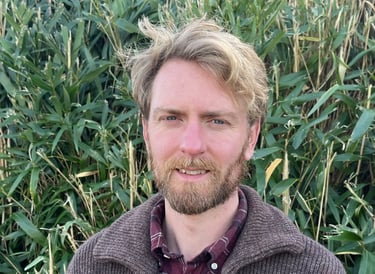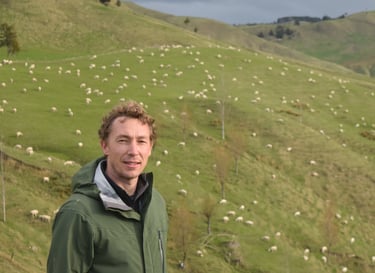The co-founders of Verdantia Research - Who are we?
Tom Mackay-Smith and Raphael Spiekermann
10/24/20233 min read
Dr Tom Mackay-Smith is a Landscape Ecologist and Soil Scientist with research experience in landscape design, tree establishment, soil science, agronomy, nutrient management, ecology and bird conservation.
Dr Raphael Spiekermann is a Geomorphologist and Geospatial Modeller, with research experience in measuring and modelling erosion processes, particularly shallow landslides.
We are scientists with nearly two decades of combined research experience working on silvopastoral systems, in New Zealand and overseas.
After working on silvopastoral systems in research positions, we wanted to use our knowledge to help farmers use native silvopastoral systems to solve some of the current challenges of farming in hill country and turn farms into more resilient and productive enterprises.
Dr Tom Mackay-Smith
Tom is originally from the UK and emigrated in 2019 to New Zealand.
His grandfather was a kiwi who emigrated to the UK to join the British navy. He is related to Henry Williams, one of the first missionaries to work in New Zealand from the UK, and was keen to come to New Zealand to explore his New Zealand heritage.
Before forming Verdantia Research, Tom previously worked as a scientist for Massey University. Whilst working at Massey he worked on a project that explored the potential of silvopastoralism in New Zealand, in addition to a poplar and kānuka establishment trial in collaboration with Manaaki Whenua – Landcare Research and Plant and Food.
Tom completed his PhD at Massey University from 2019 to 2022. His PhD measured the impact of kānuka silvopastoral systems on pasture production, pasture botanical composition, soil condition, surface runoff and sediment and nutrient losses in New Zealand hill country.
Tom has published various peer-reviewed scientific journal articles and book chapters related to silvopastoralism that include:
The impact of a kānuka silvopastoral system on surface runoff and sediment and nutrient losses
The impact of a kānuka silvopastoral system on pasture production
The impact of a kānuka silvopastoral system on pasture species composition and pasture diversity
Dr Raphael Spiekermann
Raised in the heart of the Rangitikei, Raphael spent much of his spare time on hill country farms. It was here that he came to appreciate both the challenges and appeal in hill country farming.
As a Kiwi-German, Raphael moved to Austria to study Geography, returning to New Zealand to work as a Geomorphologist at Manaaki-Whenua – Landcare Research in Palmerston North for seven years. During this time, he also undertook PhD research aimed at quantifying the effect of silvopastoral trees on reducing landslide erosion and sediment delivery to streams.
This recent research was a component of a 5-year research programme to support “Smarter Targeting of Erosion Control”. Raphael has worked with Tom on silvopastoral research projects, including leading an Our Land and Water project (National Science Challenge) aimed at identifying knowledge gaps and research needs related to biophysical mechanisms that influence silvopastoral outcomes.
Raphael has published over 20 peer-reviewed journal articles and chapters. Some relevant articles to silvopastoralism include:
Quantifying effectiveness of trees for landslide erosion control
Quantifying the influence of individual trees on slope stability at landscape scale
Comparing methods of landslide data collection for susceptibility modelling
Assessing the influence of spatial patterns in rainfall on shallow landslides
Comparing statistical and physical approaches to landslide susceptibility modelling
Modelling the effect of land management interventions and climate change on sediment loads
References
Click on the papers above to access them online. If you would like access to any of these paper, email tom@verdantiaresearch.co.nz and we'd love to send you the full paper.


Dr Tom Mackay-Smith


Dr Raphael Spiekermann
